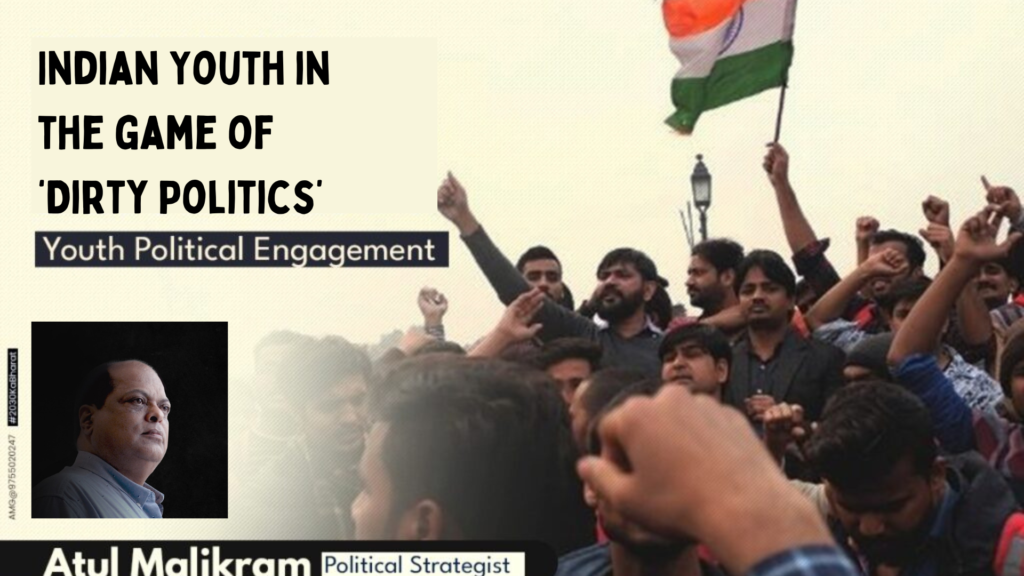In the grand tapestry of India’s progress, the stage for politics has perennially taken center spotlight. Yet, despite its pivotal role, it’s a realm often described as ‘dirty politics.’ This tag has woven itself into the very fabric of our collective understanding, with a widely held conviction that navigating the labyrinth of politics is akin to entering a ceaseless game where escape is as elusive as catching lightning in a bottle. It has been engraved in the minds of the people that once someone steps into this political arena, they find themselves ensnared in a complex web, reminiscent of quicksand, where the more one strives to ascend, the more it feels like being pulled into a vortex of challenges and controversies. Today, we find ourselves in a situation where even after being one of the most progressive and young nations, more than half of our political leaders are old and more than of retirement age.
Where is the youth of this young nation? Are they ready to get into the dirt of the Indian Political system or are satisfied being the ‘mere’ observer?
Is this gap between the old and the young leaders in politics ever going to end?
The enduring gap between older and younger leaders invites contemplation. A pervasive misconception persists, asserting that experienced candidates, typically older, are inherently better equipped to govern. Both senior leaders and public perception align in favor of experience, asserting that seasoned individuals are more capable than their younger counterparts. However, this assumption raises a critical question: how can these seasoned minds authentically comprehend the needs and aspirations of a youthful nation boasting a significant proportion of young citizens? Furthermore, the active involvement of senior politicians, orchestrating the trajectory of their successors, stifles the innovative ideas of the younger generation. Even the youth themselves often grapple with hesitations in voicing opinions or rebelling against perceived injustices, creating a breeding ground for nepotism to thrive and for senior family members to maintain control. These dynamics contribute to a concerning lack of motivation among the youth to actively engage in politics.
Politics- an ideal career path?
From early childhood, students find themselves steered by their parents toward careers in medicine, engineering, commerce, modeling, acting, teaching, and the armed forces, among other fields. The older generation often instills a negative connotation, labeling politics as ‘dirty,’ dissuading their children from participating. It is a rare sight to witness a child expressing aspirations of becoming a political leader. Even if young person wishes to pursue a career in the political arena, they encounter limited platforms, scarce career opportunities, and inadequate guidance. Unfortunately, in most cases, their intentions are not taken seriously. Politics remains a subject that students view as a hurdle to clear rather than a path to pursue for personal and societal advancement.
The youthful and dynamic India is on the brink, eager to unleash its potential and make a mark globally. However, the path to success is hindered by policymakers who have failed to keep up with the times. The older generation holds onto outdated ideas that do not align with the current reality, neglecting the needs of rural youth. Meanwhile, the urban youth seems indifferent, preferring to engage in passive discussions on social media rather than active debates. Although they express a desire for change, they are reluctant to put in the effort. Consequently, the issues persist, and instead of taking responsibility, they conveniently lay blame on politicians before retreating to foreign lands, satisfied with participating in superficial discussions from the comfort of their virtual screens.
Youth need to jump and get their hands dirty for their nation
The current generation is not content with merely following; they possess the capability to forge their paths toward achieving their goals. While many schemes and policies are made to bring forth the young generation to actively contribute to the nation-building process, the execution of the policies or provisions is still unknown. There is a pressing need to alter the prevailing perception of politics as ‘dirty’ or a ‘never-ending battle of controversies.’ Simultaneously, the older generation and parents must reassess their perception of politics, recognizing it as an essential aspect of a progressive nation. They should motivate their children to actively engage in the political landscape, encouraging healthy debates and discussions for a more informed and participative society. Governments and leaders must proactively involve the youth in the decision-making process, not only in documents or passing resolutions but also in working effectively to make them a part of the process, embracing their ideas and instilling a sense of belonging to something significant. Senior political figures should relinquish some control over the political arena, allowing the younger generation to assume a central role under their careful guidance.
Also Read: Beyond Party Lines: Factors Influencing Youth Voting Behavior in India
As India stands at the crossroads of progress, the shadows of ‘dirty politics’ persistently cast doubt on the nation’s potential. The stark contrast between the older generation’s governance and the youthful aspirations underscores the need for a paradigm shift. The reluctance of the youth to actively engage exacerbates the issue, hindering the nation’s journey toward a brighter future. The younger generation must rise above mere observation and actively participate in shaping the political landscape. Moreover, it requires the passion and commitment of the rising youth to instigate change and actively participate in the nation-building process. When the youth is self-aware, confident, and possesses a genuine passion for the progression of the nation, they can wholeheartedly jump in, get their hands dirty, and contribute meaningfully to the nation’s growth. It is this collective synergy of governmental support, seasoned guidance, and the fervor of the youth that can pave the way for a more engaged and dynamic political landscape, fostering a brighter future for the nation.


Pingback: Unraveling the Enigma: India's Youth Unemployment Crisis